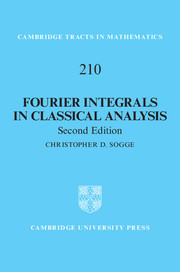Book contents
- Frontmatter
- Dedication
- Contents
- Preface to the Second Edition
- Preface to the First Edition
- 0 Background
- 1 Stationary Phase
- 2 Non-homogeneous Oscillatory Integral Operators
- 3 Pseudo-differential Operators
- 4 The Half-wave Operator and Functions of Pseudo-differential Operators
- 5 LP Estimates of Eigenfunctions
- 6 Fourier Integral Operators
- 7 Propagation of Singularities and Refined Estimates
- 8 Local Smoothing of Fourier Integral Operators
- 9 Kakeya-type Maximal Operators
- Appendix: Lagrangian Subspaces of T*Rn
- References
- Index of Notation
- Index
Preface to the First Edition
Published online by Cambridge University Press: 11 May 2017
- Frontmatter
- Dedication
- Contents
- Preface to the Second Edition
- Preface to the First Edition
- 0 Background
- 1 Stationary Phase
- 2 Non-homogeneous Oscillatory Integral Operators
- 3 Pseudo-differential Operators
- 4 The Half-wave Operator and Functions of Pseudo-differential Operators
- 5 LP Estimates of Eigenfunctions
- 6 Fourier Integral Operators
- 7 Propagation of Singularities and Refined Estimates
- 8 Local Smoothing of Fourier Integral Operators
- 9 Kakeya-type Maximal Operators
- Appendix: Lagrangian Subspaces of T*Rn
- References
- Index of Notation
- Index
Summary
Except for minor modifications, this monograph represents the lecture notes of a course I gave at UCLA during the winter and spring quarters of 1991. My purpose in the course was to present the necessary background material and to show how ideas from the theory of Fourier integral operators can be useful for studying basic topics in classical analysis, such as oscillatory integrals and maximal functions. The link between the theory of Fourier integral operators and classical analysis is of course not new, since one of the early goals of microlocal analysis was to provide variable coefficient versions of the Fourier transform. However, the primary goal of this subject was to develop tools for the study of partial differential equations and, to some extent, only recently have many classical analysts realized its utility in their subject. In these notes I attempted to stress the unity between these two subjects and only presented the material from microlocal analysis that would be needed for the later applications in Fourier analysis. I did not intend for this course to serve as an introduction to microlocal analysis. For this the reader should be referred to the excellent treatises of Hörmander [5], [7] and Treves [1].
In addition to these sources, I also borrowed heavily from Stein [4]. His work represents lecture notes based on a course that he gave at Princeton while I was his graduate student. As the reader can certainly tell, this course influenced me quite a bit and I am happy to acknowledge my indebtedness. My presentation of the overlapping material is very similar to his, except that I chose to present the material in the chapter on oscillatory integrals more geometrically, using the cotangent bundle. This turns out to be useful in dealing with Fourier analysis on manifolds and it also helps to motivate some results concerning Fourier integral operators, in particular the local smoothing estimates at the end of the monograph.
Roughly speaking, the material is organized as follows. The first two chapters present background material on Fourier analysis and stationary phase that will be used throughout. The next chapter deals with nonhomogeneous oscillatory integrals. It contains the L2 restriction theorem for the Fourier transform, estimates for Riesz means in Rn, and Bourgain's circular maximal theorem.
- Type
- Chapter
- Information
- Fourier Integrals in Classical Analysis , pp. xiii - xivPublisher: Cambridge University PressPrint publication year: 2017



